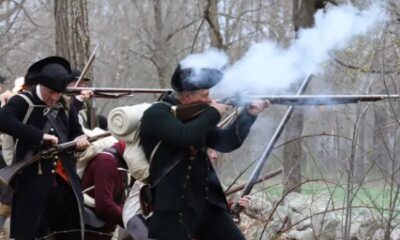Breaking News
Swamp Gas: Congress Giveth, Supreme Court Taketh Away

So much more draining to do.
It’s been a hell of an interesting week in The Swamp …
Yesterday, in a decision that many Second Amendment activists found shocking and disappointing, the U.S. Supreme Court upheld an ATF rule that treated unfinished frames and receivers and do-it-yourself-gunmaking kits as if they were complete, functioning firearms. If you’d like to read the SCOTUS decision, it’s right here (it will open a .pdf file). And no, the decision wasn’t even close; even though the court comprises a majority of originalist judges, the final decision was 7-2 with only Justices Thomas and Alito in opposition.
What’s the upshot? As of right now, with the ATF firmly in the hands of President Trump’s appointees, Americans probably shouldn’t worry too much about the ATF coming up with its own special little rules and then enforcing them without anyone’s approval. But this stands as a sharp, painful reminder that the Supreme Court is not a rubber stamp, no matter who appointed the justices or when.
It’s also an object lesson in the importance of a) a legislature dedicated to crafting well-written, Constitutionally appropriate laws; and b) an executive dedicated to bringing bureaucracies strongly to heel before they start thinking of themselves as a “fourth branch” of American governance.
This week also brought good news in the form of some good bills moving through Congress as we speak!
I’m about to write a sentence that I thought might never pass my fingertips: The U.S. House of Representatives is doing a wonderful job creating the precise, well-written laws we need to protect the Second Amendment WITHOUT having to cross our fingers and hope that court cases are decided “our way.”
Ah, that felt good.
The National Shooting Sports Foundation has five pieces of great news coming out of Congress (wow, this is going to take some getting used to), so I’m going to turn it over to them. But first, pat yourself on the back for your votes and volunteering: This is what it looks like when the grassroots all of us planted get growing, with a bumper crop of good laws just about ready for harvest.
~~~~~~~~~~~~~~~~~~~~~~~~~~~~~~~~~~~~~~~~~~~~~~~~~~~~~~
House Republicans Honor Second Amendment Promises, Advance Key Legislation
The U.S. House of Representatives Judiciary Committee held a committee bill markup hearing, a key initial hurdle before legislation can be considered for full House approval. The process gives legislators opportunity to amend the base bill before full consideration of the House. Several bills discussed during this particular markup covered pro-Second Amendment and pro-law enforcement priorities.
The approval of the bills passing out of committee is a great sign for Second Amendment supporters and the right of self-defense. It shows pro-firearm, pro-industry Members of Congress are making good on their promises to constituents as well as ensuring President Donald Trump makes good on his promises.
After all, the president declared, “I will sign concealed carry reciprocity. Your Second Amendment does not end at the state line.” President Trump made the promise in a video during the presidential campaign last year, according to Fox News. That is relevant as concealed carry reciprocity has long been a priority of Second Amendment advocates, and H.R. 38 – the Concealed Carry Reciprocity Act, introduced by U.S. Rep. Richard Hudson (R-N.C.) – was one of the bills gaining support and advancing out of the markup.
H.R. 38 – Constitutional Concealed Carry Reciprocity Act
The Constitutional Concealed Carry Reciprocity Act, H.R. 38, was introduced again this Congress. Rep. Hudson has championed the issue for several years in his attempts to get the legislation passed. NSSF has supported his efforts throughout that time. H.R. 38 would eliminate the confusion of varying state-by-state laws and provide protection for Second Amendment rights for concealed carry permit holders. The legislation would allow concealed carry permit holders, authorized by their home state, to carry a concealed firearm in other states provided they comply with the law in other states – much in the same way a driver’s license is recognized.
“This legislation eliminates the confusing patchwork of laws surrounding concealed carry permits that vary from state-to-state, particularly with regard to states where laws make unwitting criminals out of legal permit holders for a simple mistake of a wrong traffic turn,” NSSF’s Larry Keane has stated. “It safeguards a state’s right to determine their own laws while protecting the Second Amendment rights of all Americans.”
“Our Second Amendment right does not disappear when we cross invisible state lines, and this commonsense legislation guarantees that,” said Rep. Hudson in his own press release. “The Constitutional Concealed Carry Reciprocity Act will protect law-abiding citizens’ rights to conceal carry and travel freely between states without worrying about conflicting state codes or onerous civil suits. I am proud to see such strong and widespread support, and I will not stop fighting to get this legislation signed into law.”
After a long debate in the Judiciary Committee, Rep. Hudson’s bill was approved by a vote of 18-9. The next step is full House consideration.
H.R. 2243 – Law Enforcement Officer Safety Reform Act
The Law Enforcement Officer Safety Reform Act (LEOSA), H.R. 2243, is bipartisan legislation that was introduced in the House by U.S. Reps. Don Bacon (R-Neb.) and Henry Cuellar (D-Texas) to improve the original LEOSA of 2004, which gives qualified law enforcement officers – whether they are active-duty, retired or no longer working in law enforcement – the ability to carry concealed firearms in any U.S. state or territory, regardless of state or local laws.
The original legislation contained numerous exceptions that prevent qualified law enforcement officers from adequately protecting themselves and the public, including bans on concealed carry rights in certain states, local and federal government property. Rep. Bacon’s legislation would expand the law by allowing qualified officers to carry their concealed firearms in state, local and private property that is otherwise open to the public, national parks, certain federal public access facilities and school zones.
“The LEOSA Reform Act enables those individuals we already trust with our safety to be able to continue to provide that service without being encumbered by well-intentioned, but misguided laws,” Keane said about the LEOSA Reform Act. “Handcuffs belong on criminals, not law enforcement who are working to protect their communities.”
The Law Enforcement Officer Safety Reform Act passed out of committee markup by a vote of 13-11.
H.R. 2255 – Federal Law Enforcement Officer Service Weapon Purchase Act
Rep. Russell Fry (R-S.C.) is leading the effort to pass H.R. 2255, the Federal Law Enforcement Officer Service Weapon Purchase Act, to allow federal law enforcement officers to purchase retired service firearms. Currently, federal law enforcement agencies that upgrade or change the firearms issued to their agents and officers are required by Federal Management Regulations to destroy unneeded firearms. Rep. Fry’s legislation would allow certified federal law enforcement officers, who are authorized and eligible, to purchase their former service firearms.
H.R. 2255 passed by a vote of 14-9.
H.R. 2267 – the National Instant Criminal Background Check System (NICS) Data Reporting Act
Rep. Thomas Massie (R-Ky.) introduced H.R. 2267, the NICS Data Reporting Act. This bill would require the U.S. Attorney General to submit to Congress a report that includes the demographic data of persons determined to be ineligible to purchase a firearm based on a background check performed by the FBI’s National Instant Criminal Background Check System (NICS).
Rep. Massie’s legislation was approved by the Judiciary Committee by voice vote, sending the bill to full House for consideration.
H.R. 2184 – the Firearm Due Process Protection Act
Republican Majority Whip Tom Emmer (R-Minn.) introduced the Firearm Due Process Protection Act, H.R. 2184, which received bipartisan support in the markup by also receiving a voice vote of approval. Whip Emmer’s legislation would provide a legal recourse for law-abiding Americans who were improperly denied the ability to legally purchase a firearm due to administrative errors during a background check.
Second Amendment rights played a key role in President Trump’s presidential victory, as well as several U.S. senators winning key swing state seats returning the U.S. Senate to Republican control. More than 26.2 million law-abiding Americans became first-time firearm owners in just the past five years, demonstrating the importance of self-defense and home and community safety as a top priority.
The positive movement in Congress of these bills is a great sign as legislators are listening to their voters, acting and carrying through on their promises to safely guard Second Amendment rights.
-

 Breaking News4 days ago
Breaking News4 days agoNaked: Kirk Slaying Exposes Left’s Lust for Violence
-

 Breaking News4 days ago
Breaking News4 days agoCharlie Kirk Assassinated: Details, Reactions & Manhunt (Photo Released)
-

 Gun Rights2 months ago
Gun Rights2 months agoFind Someone Who Loves You As Much As Democrats Love Mass Shootings
-

 Breaking News2 weeks ago
Breaking News2 weeks agoSecond Amendment Wins: Top Gun Rights Victories This Week
-

 Breaking News4 weeks ago
Breaking News4 weeks agoBrooklyn Shooting: Gun Control Fails, 2A Needed!
-
2A Living1 week ago
Freedom Retreat 2025: Top 10 Steps to Build




